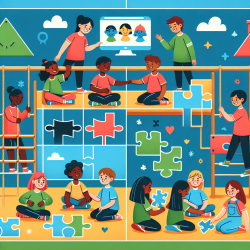As practitioners in the field of speech-language pathology, we are always striving to enhance our methods to create better outcomes for children. A recent study titled Do Children with SLI Use Verbs to Predict Arguments and Adjuncts: Evidence from Eye Movements During Listening provides valuable insights that can help us achieve this goal.
This study, conducted by Andreu, Sanz-Torrent, and Rodríguez-Ferreiro, investigates whether children with Specific Language Impairment (SLI) use verbs to predict upcoming arguments and adjuncts during sentence comprehension. The researchers employed the "visual world paradigm," a method that tracks eye movements to understand real-time language processing.
Key findings from the study include:
- Children with SLI can anticipate upcoming referents based on verb information, similar to their age-matched peers and adults.
- The proportion of looks at themes, sources/goals, and instruments (arguments) was significantly higher than looks at locatives (adjuncts) for all groups.
- No significant differences were found in anticipatory looks at target images during the verb time window, likely due to the flexible word order in Spanish.
These findings suggest that children with SLI do not suffer from significant impairments in retrieving verb semantic information to anticipate arguments and adjuncts during sentence comprehension. This challenges previous research that indicated children with SLI have difficulties with verb semantics, particularly in language production.
For practitioners, these insights offer several actionable strategies:
- Incorporate Real-Time Comprehension Tasks: Utilize tasks that require children to link spoken language to visual referents, similar to the visual world paradigm. This can help improve their real-time language processing skills.
- Focus on Verb Semantics: Develop exercises that emphasize the role of verbs in sentence comprehension. This could involve activities where children predict upcoming words based on the verb used.
- Use Simple Sentences: Given that the study used simple sentences, start with basic sentence structures before progressing to more complex ones. This can help build confidence and foundational skills in children with SLI.
Additionally, the study opens avenues for further research. Future studies could explore the differences in verb semantics' impact on language production versus comprehension. Understanding these nuances can lead to more tailored and effective intervention strategies.
To read the original research paper, please follow this link: Do Children with SLI Use Verbs to Predict Arguments and Adjuncts: Evidence from Eye Movements During Listening.










